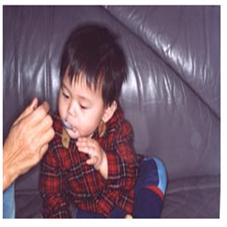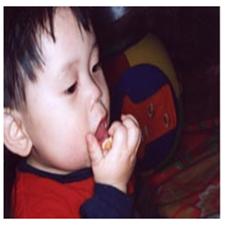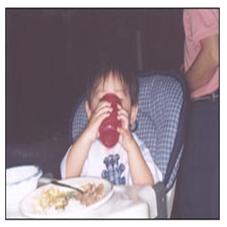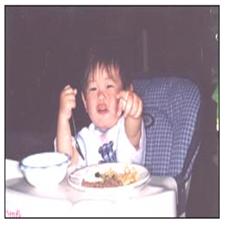생후 몇 개월까지 인공영양을 먹여야 하나, By what month of age should infant formula to be fed

사진 3-74. 이유식을 애써 먹으려 하고 먹고 소화를 잘 시키고.
Copyright ⓒ 2011 John Sangwon Lee, MD, FAAP

사진 3-75. 혼자서 아기 이유식 과자를 잘 먹고.
Copyright ⓒ 2011 John Sangwon Lee, MD, FAAP

사진 3-76. 컵으로 이유식을 잘 먹고 마시고.
Copyright ⓒ 2011 John Sangwon Lee, MD, FAAP

사진 3-77. 잘 먹을 수 있게 만든 식구들 밥상 음식물을 잘 먹고 소화를 잘 시키고 잘 성장 발육하면 인공영양을 더 이상 주지 않아도 된다.
Copyright ⓒ 2011 John Sangwon Lee, MD, FAAP
생후 언제까지 인공영양을 먹을 수 있고 언제부터 이유식을 먹이기 시작해야 아기의 건강에 가장 좋은지 일률적으로 말할 수 없다.
- 그러나 다음과 같은 여러 가지의 상황과 문제점을 잘 고려한 후 이유식을 먹이기 시작하면 좋을 것이다.
-
- 생후 4~6개월까지 모유만 먹는 영아들이나 인공영양만 먹는 영아들은 그들의 성장 발육에 필요로 하는 영양분과 칼로리를 먹는 모유나 인공영양에서 충분히 충족할 수 있다.
- 생후 4~6개월까지 거의 모든 영아들은 인공영양이나 모유만 먹어도 정상적으로 성장 발육할 수 있다
- 생후 4~6개월까지 영아들이 인공영양을 충분히 먹으면 비타민제와 철분제를 추가로 더 먹일 필요가 없다. 그러나 생후 4~6개월 이후부터 모유만 먹는 영아들에게 종합비타민제(특히 비타민 A, D, C), 철분제와 불소제를 의사의 처방에 따라 특별히 먹일 필요가 있다.
- 인공영양을 먹는 영아들에게 특별한 이유 없이 생후 4개월 이전 이유식을 먹여서는 안 된다.
- 어떤 영아들은 생후 6~9개월경부터 인공영양을 먹기 싫어하고 이유식을 주로 먹는다.
- 어떤 유아들은 생후 9~10개월 이후 인공영양을 거의 먹지 않고 이유식과 부모와 식구들이 먹는 밥상 음식물을 주로 먹는다.
- 생후 12개월 이후에도 인공영양을 먹일 수 있다. 그러나 생후 12개월 이전까지만 인공영양을 먹이는 것을 권장한다.
- 돌 이후 유아가 이유식도 잘 먹고 집안 식구들이 먹는 밥상 음식물을 잘 먹으면 인공영양 대신 전 우유(Whole milk)를 먹이는 것이 보통이다.
- 이때부터 가능한 한 인공영양을 꼭 먹일 필요가 없다.
By what month of age should infant formula to be fed

Photo 3-74. I try to eat baby food and eat and digest well. Copyright ⓒ 2011 John Sangwon Lee, MD, FAAP

Photo 3-75. Eating baby food sweets by yourself. Copyright ⓒ 2011 John Sangwon Lee, MD, FAAP

Photo 3-76. Eat and drink baby food with a cup. Copyright ⓒ 2011 John Sangwon Lee, MD, FAAP

Photo 3-77. Family members are made to eat well If you eat good food, digest well, and grow and develop well, you do not need to give artificial nutrition anymore. Copyright ⓒ 2011 John Sangwon Lee, MD, FAAP
It is impossible to say unequivocally how long you can eat artificial nutrition after birth and when you start feeding baby foods is best for your baby’s health.
However, it would be good to start feeding baby food after carefully considering the following situations and problems
Up to 4 to 6 months of age, infants who only eat breast milk or infants who only eat artificial nutrition can be sufficiently satisfied with breast milk or artificial nutrition that eats the nutrients and calories required for their growth and development.
Up to 4-6 months of age, almost all infants can grow and develop normally by eating artificial nutrition or breast milk alone.
By 4-6 months of age, if infants eat enough artificial nutrition, they do not need additional vitamins and iron supplements.
However, from 4 to 6 months after birth, multivitamins (especially vitamins A, D, C), iron and fluoride drugs need to be specially fed according to the doctor’s prescription for infants who only eat breast milk.
Infants who eat artificial nutrition should not be fed baby food before 4 months of age for no specific reason.
Some infants do not like to eat artificial nutrition from 6 to 9 months of age and eat baby food mainly. Some infants rarely eat artificial nutrition after 9 to 10 months of age and mainly eat baby food and meals for parents and family members.
Artificial nutrition can be fed even after 12 months of age. However, it is recommended to feed artificial nutrition only up to 12 months of age.
It is common to feed whole milk instead of artificial nutrition if infants eat well baby food and eat well at the table foods that family members eat.
From this point on, it is not necessary to feed artificial nutrition as much as possible.
출처 및 참조 문헌
- NelsonTextbook of Pediatrics 22ND Ed
- The Harriet Lane Handbook 22ND Ed
- Growth and development of the children
- Red Book 32nd Ed 2021-2024
- Pediatric Nutritional Handbook American Academy of Pediatrics
- 소아가정간호백과–부모도 반의사가 되어야 한다, 이상원 저
- The pregnancy Bible. By Joan stone, MD. Keith Eddleman,MD
- Neonatology Jeffrey J.Pomerance, C. Joan Richardson
- Preparation for Birth. Berverly Savage and Dianna Smith
- 임신에서 신생아 돌보기까지. 이상원
- Breastfeeding. by Ruth Lawrence and Robert Lawrence
-
- Pediatric Nutritional Handbook American Academy of Pediatrics
- 소아가정간호백과–부모도 반의사가 되어야 한다, 이상원 저
- The pregnancy Bible. By Joan stone, MD. Keith Eddleman,MD
- Neonatology Jeffrey J.Pomerance, C. Joan Richardson
- Preparation for Birth. Berverly Savage and Dianna Smith
- 임신에서 신생아 돌보기까지. 이상원
- Breastfeeding. by Ruth Lawrence and Robert Lawrence
- www.drleepediatrics.com 제1권 소아청소년 응급 의료
- www.drleepediatrics.com 제2권 소아청소년 예방
- www.drleepediatrics.com 제3권 소아청소년 성장 발육 육아
- www.drleepediatrics.com 제4권 모유,모유수유, 이유
- www.drleepediatrics.com 제5권 인공영양, 우유, 이유식, 비타민, 미네랄, 단백질, 탄수화물, 지방
- www.drleepediatrics.com 제6권 신생아 성장 발육 육아 질병
- www.drleepediatrics.com제7권 소아청소년 감염병
- www.drleepediatrics.com제8권 소아청소년 호흡기 질환
- www.drleepediatrics.com제9권 소아청소년 소화기 질환
- www.drleepediatrics.com제10권. 소아청소년 신장 비뇨 생식기 질환
- www.drleepediatrics.com제11권. 소아청소년 심장 혈관계 질환
- www.drleepediatrics.com제12권. 소아청소년 신경 정신 질환, 행동 수면 문제
- www.drleepediatrics.com제13권. 소아청소년 혈액, 림프, 종양 질환
- www.drleepediatrics.com제14권. 소아청소년 내분비, 유전, 염색체, 대사, 희귀병
- www.drleepediatrics.com제15권. 소아청소년 알레르기, 자가 면역질환
- www.drleepediatrics.com제16권. 소아청소년 정형외과 질환
- www.drleepediatrics.com제17권. 소아청소년 피부 질환
- www.drleepediatrics.com제18권. 소아청소년 이비인후(귀 코 인두 후두) 질환
- www.drleepediatrics.com제19권. 소아청소년 안과 (눈)질환
- www.drleepediatrics.com 제20권 소아청소년 이 (치아)질환
- www.drleepediatrics.com 제21권 소아청소년 가정 학교 간호
- www.drleepediatrics.com 제22권 아들 딸 이렇게 사랑해 키우세요
- www.drleepediatrics.com 제23권 사춘기 아이들의 성장 발육 질병
- www.drleepediatrics.com 제24권 소아청소년 성교육
- www.drleepediatrics.com 제25권 임신, 분만, 출산, 신생아 돌보기
- Red book 29th-31st edition 2021
- Nelson Text Book of Pediatrics 19th- 21st Edition
- The Johns Hopkins Hospital, The Harriet Lane Handbook, 22nd edition
- 응급환자관리 정담미디어
-
소아가정간호백과–부모도 반의사가 되어야 한다, 이상원
-
Neonatal Resuscitation American heart Association
-
Neonatology Jeffrey J.Pomerance, C. Joan Richardson
-
Pediatric Resuscitation Pediatric Clinics of North America, Stephen M. Schexnayder, M.D.
-
Pediatric Critical Care, Pediatric Clinics of North America, James P. Orlowski, M.D.
-
Preparation for Birth. Beverly Savage and Dianna Smith
-
Infectious disease of children, Saul Krugman, Samuel L Katz, Ann A. Gershon, Catherine Wilfert
- Pediatric Nutritional Handbook American Academy of Pediatrics
- 소아가정간호백과–부모도 반의사가 되어야 한다, 이상원
- The pregnancy Bible. By Joan stone, MD. Keith Eddleman, MD
- Neonatology Jeffrey J. Pomerance, C. Joan Richardson
- Preparation for Birth. Beverly Savage and Dianna Smith
- 임신에서 신생아 돌보기까지. 이상원
- Breastfeeding by Ruth Lawrence and Robert Lawrence
- Infectious disease of children, Saul Krugman, Samuel L Katz, Ann A. Gershon, Catherine Wilfert
- 제4권 모유, 모유수유, 이유 참조문헌 및 출처
- 제5권 인공영양, 우유, 이유, 비타민, 단백질, 지방 탄수 화물 참조문헌 및 출처
- 제6권 신생아 성장발육 양호 질병 참조문헌 및 출처
- 소아과학 대한교과서
|
Copyright ⓒ 2015 John Sangwon Lee, MD, FAAP 미국 소아과 전문의, 한국 소아청소년과 전문의 이상원 저 “부모도 반의사가 되어야 한다”-내용은 여러분들의 의사로부터 얻은 정보와 진료를 대신할 수 없습니다. “The information contained in this publication should not be used as a substitute for the medical care and advice of your doctor. There may be variations in treatment that your doctor may recommend based on individual facts and circumstances. “Parental education is the best medicine.” |